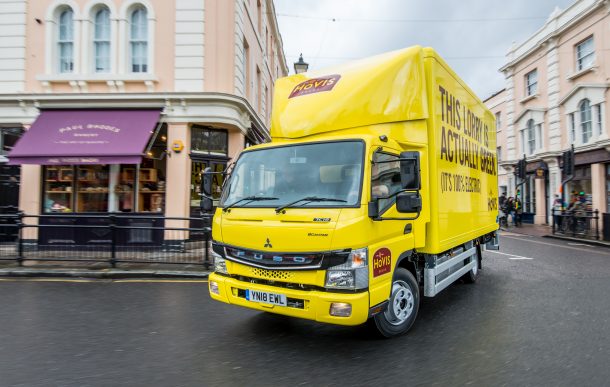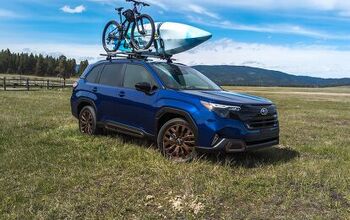Volvo Introduces First Fully Electric Truck, Joins Fuso in Mainstream BEV Push

While North America awaits Tesla Motors’ electrified big rig, the rest of the globe’s manufacturers are working on battery driven commercial vehicles of their own. These vehicles may not be able to match the Tesla’s size or ability to do burnouts, but their existence shows companies are taking electrification seriously.
FedEx, which has already reserved a handful of the Tesla trucks, bragged it would soon deploy Navistar-sourced electric trucks way back in 2010. However, with the exception of ultra-dense urban environments and shipping hubs, these units haven’t see a lot of action. For the most part, the addition of zero-emission vehicles seem like a good way for companies to virtue signal and test the feasibility of such a platform in a commercial setting. For example, UPS issued a press release in February saying it wanted to develop 50 battery electric vans that might someday replace its fleet of 35,000 gasoline- and diesel-powered vehicles.
Still, there’s momentum building behind alternative energy vehicles in the commercial sector. Daimler-owned Mitsubishi Fuso Truck and Bus Corporation started the slow rollout of its eCanter courier truck last September. It probably won’t break any sales records for the brand, but it does show manufacturers’ desire to not just develop, but sell these things at a meaningful volume — and it’s soon to be followed by Volvo Trucks’ brand new FL Electric.
Appearing as a direct competitor for the eCanter, Volvo’s FL Electric offers roughly the same recipe in an somewhat larger package. Considering both vehicles are intended primarily for hauling modestly sized loads in and around densely populated cities, we doubt the little Fuso will suffer too egregiously.
Trimmed out in its biggest and most powerful form, the electrified Fuso has a chassis load capacity of 4.9 tons. The estimated maximum range of the 70 kWh eCanter exceeds 62 miles under idyllic circumstances, but a full load will surely drag that down somewhat. Maximum output clocks in at 248 horsepower and 280 ft-lb of torque. However, Fuso says it intends to upgrade the model in terms of size, range, and power very soon.
Meanwhile, the all new FL Electric from Volvo Trucks promises a 100-300 kWh battery pack capable of a maximum range of roughly 186 miles. In its biggest and baddest form, the FL pumps out 248 horsepower and 313 ft-lb. Gross vehicle weight is 17.6 tons vs the eCanter’s 8.2 tons. Unlike the Fuso’s single cog, the Volvo uses a two-speed transmission.
By and large, these specs don’t give them a huge advantage over their closest diesel-powered relatives. In fact, most of Fuso’s internal combustion box trucks can best the electrified version in terms of torque and payload by a sizable margin. But given the infancy of battery technology and potential fuel savings a battery equipped commercial vehicle can offer, it would be crazy for any truck manufacturer to outright ignore electrification.
[Images: Volvo Trucks; Daimler Trucks]

A staunch consumer advocate tracking industry trends and regulation. Before joining TTAC, Matt spent a decade working for marketing and research firms based in NYC. Clients included several of the world’s largest automakers, global tire brands, and aftermarket part suppliers. Dissatisfied with the corporate world and resentful of having to wear suits everyday, he pivoted to writing about cars. Since then, that man has become an ardent supporter of the right-to-repair movement, been interviewed on the auto industry by national radio broadcasts, driven more rental cars than anyone ever should, participated in amateur rallying events, and received the requisite minimum training as sanctioned by the SCCA. Handy with a wrench, Matt grew up surrounded by Detroit auto workers and managed to get a pizza delivery job before he was legally eligible. He later found himself driving box trucks through Manhattan, guaranteeing future sympathy for actual truckers. He continues to conduct research pertaining to the automotive sector as an independent contractor and has since moved back to his native Michigan, closer to where the cars are born. A contrarian, Matt claims to prefer understeer — stating that front and all-wheel drive vehicles cater best to his driving style.
More by Matt Posky
Latest Car Reviews
Read moreLatest Product Reviews
Read moreRecent Comments
- Varezhka I have still yet to see a Malibu on the road that didn't have a rental sticker. So yeah, GM probably lost money on every one they sold but kept it to boost their CAFE numbers.I'm personally happy that I no longer have to dread being "upgraded" to a Maxima or a Malibu anymore. And thankfully Altima is also on its way out.
- Tassos Under incompetent, affirmative action hire Mary Barra, GM has been shooting itself in the foot on a daily basis.Whether the Malibu cancellation has been one of these shootings is NOT obvious at all.GM should be run as a PROFITABLE BUSINESS and NOT as an outfit that satisfies everybody and his mother in law's pet preferences.IF the Malibu was UNPROFITABLE, it SHOULD be canceled.More generally, if its SEGMENT is Unprofitable, and HALF the makers cancel their midsize sedans, not only will it lead to the SURVIVAL OF THE FITTEST ones, but the survivors will obviously be more profitable if the LOSERS were kept being produced and the SMALL PIE of midsize sedans would yield slim pickings for every participant.SO NO, I APPROVE of the demise of the unprofitable Malibu, and hope Nissan does the same to the Altima, Hyundai with the SOnata, Mazda with the Mazda 6, and as many others as it takes to make the REMAINING players, like the Excellent, sporty Accord and the Bulletproof Reliable, cheap to maintain CAMRY, more profitable and affordable.
- GregLocock Car companies can only really sell cars that people who are new car buyers will pay a profitable price for. As it turns out fewer and fewer new car buyers want sedans. Large sedans can be nice to drive, certainly, but the number of new car buyers (the only ones that matter in this discussion) are prepared to sacrifice steering and handling for more obvious things like passenger and cargo space, or even some attempt at off roading. We know US new car buyers don't really care about handling because they fell for FWD in large cars.
- Slavuta Why is everybody sweating? Like sedans? - go buy one. Better - 2. Let CRV/RAV rust on the dealer lot. I have 3 sedans on the driveway. My neighbor - 2. Neighbors on each of our other side - 8 SUVs.
- Theflyersfan With sedans, especially, I wonder how many of those sales are to rental fleets. With the exception of the Civic and Accord, there are still rows of sedans mixed in with the RAV4s at every airport rental lot. I doubt the breakdown in sales is publicly published, so who knows... GM isn't out of the sedan business - Cadillac exists and I can't believe I'm typing this but they are actually decent - and I think they are making a huge mistake, especially if there's an extended oil price hike (cough...Iran...cough) and people want smaller and hybrids. But if one is only tied to the quarterly shareholder reports and not trends and the big picture, bad decisions like this get made.




































Comments
Join the conversation
Stop start driving, depot based, parked overnight, short range, often size rather than weight limited. All perfect conditions for battery power. City trucks are absolutely where electric is best suited and it really makes me wonder why Tesla decided to start with semis. I read an article on hybrid rubbish trucks the other day. They were saying that with the full power, stop, full power driving they are subjected to a thousand times a day the electric ones were saving huge amounts in maintenance.
How long have they been using electric "milk floats" in England? A very long time, I believe.